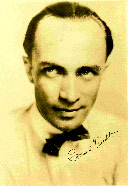
The Conrad Veidt Society
Then I made a film called "The Indian Memorial" which had a far wider, popular appeal. This brought me a much larger public, was the beginning of fan mail. In many early films with me played a remarkable young actress. But she rang the bells for herself with joy and sorrow. Perhaps she never had the success she felt her talent and beauty entitled her to. To be with her was a perpetual surprise and often an embarrassment. I remember one evening when I was taking her out to dinner. We were both dressed, for we were to dine en fete. It was a gala night at some hotel and many friends were to be present. Down the staircase we walked together, myself in opera hat and cloak, she looking lovely in an ermine cape which she held tightly around her. The place was crowded, the scene lively. Suddenly, as she walked down the stairs together, she calmly released her cape. She hadn't a stitch on.... Everybody gasped. I pretended I wasn't there. I walked ahead trying to look dignified. Then, having created the sensation she wanted, she calmly picked up her cape again, clutched it around her, and walked on smiling as if nothing had happened. She was a flame consuming herself. I heard she died, under thirty, alone, poor and ill. Poor little girl. Life was not enough for her. She had to die to have her last sensation
I was still unhappy. The people I met seemed to give me no answer to my search.
My mother's memory was always to me very sacred and very dear. I related all my
everyday actions to what I thought she would wish me to do. But I grew resentful
against the entire domination of this mother-
I played in one film which was called "The Hands of Orlac". It was a very macabre story, about a great pianist whose hands were mutilated in a railway smash. A specialist grafted a pair of hands on to him, the hands of a man about to be executed for murder. As the story unfolded you saw that these hands began to have a life of, their own and do things utterly alien to the character of the pianist. I was in the theatre on the opening night, and I have never seen such an astonishing scene. All over the theatre there were shouts and cries; women fainted; men shouted, "It is terrible to show a film like this". It was hissed and whistled at. And in Germany the whistle means what you call here the bird. I sat there thinking, "Well, this is a flop." I went in front of the curtain. The house quieted down. I spoke a few words, telling them about the making of the picture, my own feelings. I tried to smooth them down. And, to my own surprise, l,succeeded. The atmosphere changed. The audience who had been whistling and hissing now applauded...... Two other important pictures followed, in both of which I had the privilege of playing with a young Austrian girl who has since set the world alight with the flame of her genius. What is there in this curious little piece of womanhood, plain almost, if you can be plain with beautiful eyes and an exquisite expression. Of course you cannot. And of course she is not plain. At times she can make you think her beautiful. Here is a woman who is almost not a woman, her quality is so fire. Spirituelle describes her; her feet are never on the ground. You simply do not regard her as an ordinary human being. She is an angel, or a choir boy singing in his shrill sweet treble that is, to me, one of the loveliest sounds in the world.
At least that is what you think -
The Story of Conrad Veidt
SUNDAY DISPATCH, OCTOBER 1934
(Continued)